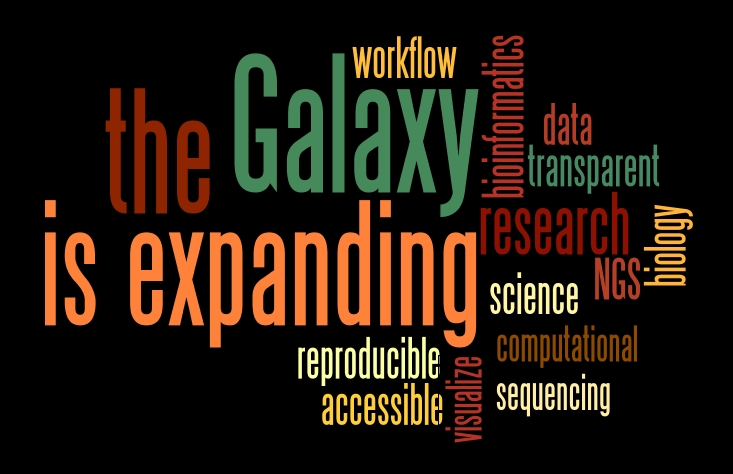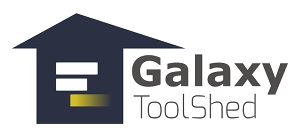November 2017 Galaxy News
Welcome to the November 2017 Galactic News, a summary of what is going on in the Galaxy community. If you have anything to add to next month’s newsletter, then please send it to outreach@galaxyproject.org.
The Galactic Blog
The new Galactic Blog was launched in October. The Galactic Blog is a place for longer-form posts that are relevant to Galaxy. (See Galaxy News for shorter-form items.) The Galactic Blog replaces the former Community Log and includes all content from it, which is why, even though the blog is new, it includes entries back to 2013.
The blog is off to a running start with these posts in October:
- ELIXIR Galaxy Community, by Frederik Coppens, Gildas Le Corguillé, and Björn Grüning
- Public Galaxy Server Dashboard, by Helena Rasche
- SciPy and scikit-learn integration into Galaxy, by Björn Grüning
- Small genome assembly in Galaxy, by Anton Nekrutenko
- Galaxy: the first 5,000 pubs, by Dave Clements
The Galactic Blog needs you!
The Galaxy community needs to know what you are doing. If you have done something that others would benefit from knowing then please create a Galactic Blog post describing your experiences.
Blog posts can either be directly created on the Hub, or can be posted on your favorite blogging platform and linked to from the Blog home page. See the CONTRIBUTING page for how.
Questions? Ask us.
Publications
The Galaxy Publication Library surpassed 5,000 publications, in October. It was a good month for publications in other ways too:
Highlighted Publications
The Galactic and Stellar publications added in October were:
- ThreaDNA: predicting DNA mechanics’ contribution to sequence selectivity of proteins along whole genomes, Jasmin Cevost, Cédric Vaillant, Sam Meyer. Bioinformatics, btx634, doi: 10.1093/bioinformatics/btx634, Published: 09 October 2017
- SNVPhyl: a single nucleotide variant phylogenomics pipeline for microbial genomic epidemiology, Aaron Petkau, Philip Mabon, Cameron Sieffert, Natalie C. Knox, Jennifer Cabral, Mariam Iskander, Mark Iskander, Kelly Weedmark, Rahat Zaheer, Lee S. Katz, Celine Nadon, Aleisha Reimer, Eduardo Taboada, Robert G. Beiko, William Hsiao, Fiona Brinkman, Morag Graham, Gary Van Domselaar. Microbial Genomics 2017 Jun 30; 3(6): e000116. Published online 2017 Jun 8. doi: 10.1099/mgen.0.000116
- An Arranged Marriage: Integrating DKPro Core in the Language Analysis Portal, Milen Kouylekov, Emanuele Lapponi, Stephan Oepen, and Richard Eckart de Castilho. CLARIN2017 Book of Abstracts
- An Architecture for Genomics Analysis in a Clinical Setting Using Galaxy and Docker, W. Digan, H. Countouris, M. Barritault, D. Baudoin, P. Laurent-Puig, H. Blons, A. Burgun, B. Rance. GigaScience, gix099, doi: 10.1093/gigascience/gix099 Published: 18 October 2017
- Bioconda: A sustainable and comprehensive software distribution for the life sciences, Björn Grüning, Ryan Dale, Andreas Sjödin, Jillian Rowe, Brad A. Chapman, Christopher H. Tomkins-Tinch, Renan Valieris, The Bioconda Team, Johannes Köster, bioRxiv 207092, doi: https://doi.org/10.1101/207092
- Cloud Computing for Science and Engineering, Ian Foster and Dennis B. Gannon. . MIT Press; 2017 Sep 22
Publication Topics
110 new publications referencing, using, extending, and implementing Galaxy were added to the Galaxy Publication Library in October.
| # | Tag | # | Tag | # | Tag | # | Tag | |||
|---|---|---|---|---|---|---|---|---|---|---|
| 56 | +Methods | 17 | +RefPublic | 16 | +Workbench | 16 | +UsePublic | |||
| 15 | +UseMain | 10 | +UseLocal | 9 | +Reproducibility | 9 | +Tools | |||
| 5 | +IsGalaxy | 4 | +HowTo | 4 | +Shared | 3 | +Cloud | |||
| 3 | +Unknown | 1 | +Project |
We also added tags to papers that reference, use, or implement a Galaxy Public Server. See below for this list.
Events
Galaxy (and GMOD) at Plant and Animal Genome XXVI
The 26th Plant and Animal Genome Conference will be held January 13-17, in San Diego, California. PAG is the largest ag-genomics meeting in the world and Galaxy will be there to help researchers get the most from their data. There will be a Galaxy Workshop with 4 talks, and a Galaxy Community Update talk during the GMOD session. See the Galaxy @ PAG page for details. (We’ll also list Galaxy related posters and Digital Tools and Resources talks once they are scheduled.)
GMOD @ PAG

GMOD (of which Galaxy is a part) has a bunch of things going on at PAG that are of interest to the Galaxy Community:
- Meg Staton will speak about the Tripal-Galaxy bridge
- There will be a GMOD workshop on the last day of PAG.
- The Tripal Project will have a user meeting on January 11, and a hackathon on January 12. Register here.
- GMOD will have a project-wide hackathon on January 11-12.
If you are interested in supporting better integration of Galaxy with other GMOD components then please give the two hackathons a look.
| Deadlines | |
|---|---|
| Oct 31 | PAG Early registration ends |
| Nov 10 | Digital Tools and Resources and Poster track abstract submission ends |
Upcoming events
There are a plenitude of Galaxy related events coming up in the next few months:
See the Galaxy Events Google Calendar for details on other events of interest to the community.
Who’s Hiring

The Galaxy is expanding! Please help it grow.
- Développeur d’outils MS/MS pour le projet Workflow4Metabolomics sous Galaxy, Station Biologique de Roscoff, France
- Bioinformaticien Gustave Roussy, Villejuif, France
- The Blankenberg Lab in the Genomic Medicine Institute at the Cleveland Clinic Lerner Research Institute is hiring postdocs.
- Galaxy Project is hiring software engineers and postdocs at Johns Hopkins, Baltimore, Maryland, United States
- Implémentation d’outils d’analyse et de visualisation de variations structurales et génomes mosaïques, IRD (Institut de Recherche pour le Développement), Montpellier, France
- Bioinformatics Research Associate, Huttenhower Lab, Harvard School of Public Health, Boston, Massachusetts, United States
Got a Galaxy-related opening? Send it to outreach@galaxyproject.org and we’ll put it in the Galaxy News feed and include it in next month’s update.
Public Galaxy Server News
There are over 90 publicly accessible Galaxy servers and six semi-public Galaxy services. Here’s what happened with them in October.
Public Servers in October’s Publications
As part of the move to Zotero, we have started tagging papers that use, mention, implement or extend public Galaxy Servers with the server name. Here are the counts for October’s papers.
| # | Server | # | Server | # | Server | # | Server | |||
|---|---|---|---|---|---|---|---|---|---|---|
| 10 | >Huttenhower | 3 | >Workflow4Metabolomics | 2 | >VirAmp | 2 | >GVL-Unspecified | |||
| 2 | >WUR | 2 | >GVL-QLD | 1 | [>Whale Shark](https://www.zotero.org/groups/1732893/galaxy/tags/>Whale Shark) | 1 | >Jetstream | |||
| 1 | >RiboGalaxy | 1 | >BF2I-MAP | 1 | >APOSTL | 1 | >GIO | |||
| 1 | >BioCiphers | 1 | >DeepTools | 1 | >ARGalaxy | 1 | >RepeatExplorer | |||
| 1 | >Oqtans | 1 | >BioMaS | 1 | >ABiMS |
Citation sections added to Public servers directory
The public Galaxy server directory was updated in October to include a Citation(s) section for each server. If you use a server in your research, then please cite it.
BF2I-MAP
The BF2I-MAP server features locally developed (as well as standard tools) including ThreaDNA, which “allows generalising the approach to a large class of DNA-binding proteins.” (Cevost et al.). BF2I-MAP is supported by the Laboratoire de Microbiologie, Adaptation et Pathogénie, Biologie Fonctionnelle Insectes et Interactions, L’Université Claude Bernard Lyon 1, and INSA de Lyon
Citations
- ThreaDNA: predicting DNA mechanics’ contribution to sequence selectivity of proteins along whole genomes by Jasmin Cevost, Cédric Vaillant and Sam Meyer, Bioinformatics, btx634, doi: 10.1093/bioinformatics/btx634, Published: 09 October 2017
- BF2I-MAP tagged publications in Galaxy Publication library.
Almost a public server: Language Analysis Portal
One of this month’s highlighted papers (Kouylekov et al) describes the Language Analysis Portal, which is built on Galaxy and is described as:
The UiO Language Analysis Portal (LAP) enables non-technical end users to employ state-of-the-art tools for natural language processing processing (NLP) at the click of a few buttons; a typical scenario is for a user to upload some ‘raw’ textual data, invoke LAP linguistic analysis tools to create annotations of the text, export processing results into a format suitable for analysis by the user, and download the resulting file(s) back onto their own computer.
LAP is part of the national implementation in Norway of the European Common Language and Technology Infrastructure (CLARIN).
It’s always great to see Galaxy applied in non-genomic domains, and LAP is a great example of how this can be done. Unfortunately, it falls just short of the definition of a public Galaxy server. Alas, it is accessible to many, but not all academic users. So we recommend taking a look at it, but we can’t list it in the directory.
Tools
ToolShed Contributions
 ](http://toolshed.g2.bx.psu.edu/)
](http://toolshed.g2.bx.psu.edu/)Tool Shed contributions in October.
Releases
StarForge 0.3.1-5
StarForge help build Galaxy things in virtualization:
- Build Galaxy Tool Shed dependencies
- Build Python Wheels (e.g. for the Galaxy Wheels Server)
- Rebuild Debian or Ubuntu source packages (for modifications)
These things will be built in Docker. Additionally, wheels can be built in QEMU/KVM virtualized systems. StarForge has had several updates this fall. Fixes and new features include:
- Support xz/lzma tarballs for wheel builds Pull Request 166
- Native support for auditwheel and delocate. (#160)
- Do not build sdists with the wheel subcommand by default. (#155)
- Fix a bug where the wrong working directory was set when building wheels with multiple sources. (#154)
- Fix a bug with sudo and brew install on macOS. (#151).
- Short circuit platform caching on OS X (#150).
sequence_utils 1.1.2
Galaxy’s sequence utilities are a set of Python modules for reading, analyzing, and converting sequence formats. See the release notes for what’s new this month.
Earlier Releases
Other packages that have been released in the prior 4 months.
Planemo 0.45 - 0.46.1
Planemo is a set of command-line utilities to assist in building tools for the Galaxy project. These releases included numerous fixes and enhancements.
See GitHub for details.
BioBlend 0.10.0
BioBlend is a Python library for interacting with CloudMan and Galaxy‘s API. BioBlend makes it possible to script and automate the process of cloud infrastructure provisioning and scaling via CloudMan, and running of analyses via Galaxy.
See the release notes for what’s new in release 0.10.0.
galaxy-lib 17.9.4-9
galaxy-lib is a subset of the Galaxy core code base designed to be used as a library. This subset has minimal dependencies and should be Python 3 compatible. It’s available from GitHub and PyPi.
This set of revisions includes:
- Latest updates from the upcoming 17.09 release - including updating the default target Conda version and fixes for module resolution.
- Updated CWL utilities.
- Remove command lint check that is no longer valid.
- Bring in various Galaxy updates including numerous Conda fixes and changes (thanks to @nsoranzo.
- Improved error handling when parsing tool reStructuredText (thanks to @erasche).
Pulsar 0.8.0
A Pulsar update was released in September. Pulsar is a Python server application that allows a Galaxy server to run jobs on remote systems (including Windows) without requiring a shared mounted file systems. Unlike traditional Galaxy job runners - input files, scripts, and config files may be transferred to the remote system, the job is executed, and the results are transferred back to the Galaxy server - eliminating the need for a shared file system.
This release adds several features and 4 bug fixes.
nebulizer 0.4.2
Command-line utilities to help with managing users, data libraries and tools in a Galaxy instance, using the Galaxy API via the BioBlend library.
CAVEAT nebulizer is still a work in progress; please exercise caution when attempting irreversible operations especially against production Galaxy instances (for example when creating users or data libraries).
CloudBridge 0.3.3
CloudBridge aims to provide a simple layer of abstraction over different cloud providers, reducing or eliminating the need to write conditional code for each cloud. It is currently under development and is in an Alpha state.
May 2017 Galaxy Release (v 17.05)
The Galaxy Committers published the 17.05 release of Galaxy in May.
Galaxy Docker Image 17.05
The Galaxy Docker project has seen a new release, following Galaxy 17.05. Major features are an additional Docker compose setup with SLURM and HT-Condor deployments, BioContainers integration and much more automatic testing.
And
- The Galaxy Docker Project has reached more than 23k downloads on Dockerhub - not counting quay.io and all flavors
- From John Chilton:
- Awesome new mode for docker-galaxy-stable by Björn Grüning: container scheduling with Condor
And the rest …
Other Galaxy packages that haven’t had a release in the past four months can be found on GitHub.
Other News
- From Stephan Nothjunge:
- Galaxy is a computational milestone, according to DNA sequencing at 40: past, present and future by Shendure et al.
- Five years of Galaxy-P presentations and posters









